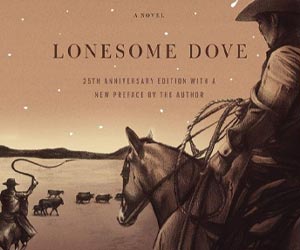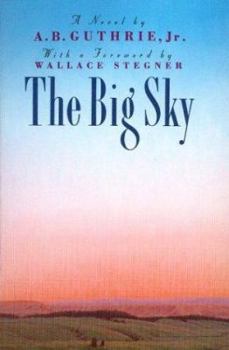Book Overview
From Pulitzer Prize-winning author A. B. Guthrie, Jr., The Big Sky is a classic portrait of America's vast frontier that inspired the Western genre in fiction.The Best Novel of the American West as... This description may be from another edition of this product.
Format:Paperback
Language:English
ISBN:0395611539
ISBN13:9780395611531
Release Date:January 1992
Publisher:Mariner Books
Length:386 Pages
Weight:0.95 lbs.
Dimensions:1.0" x 5.5" x 8.2"
Related Subjects
Action & Adventure Children's Books Fiction Genre Fiction Historical Literature & Fiction WesternsCustomer Reviews
6 ratings
Then & Now
Published by Mike , 5 years ago
I liked most of the book, this was a time in america that few can relate to. Those people were Free from all of trappings that we are surrounded with today!! They could survive with little!! People today could not!!
Guthrie Captures the West and the End of an Era
Published by Thriftbooks.com User , 18 years ago
The Big Sky is the first in a series of great Western novels by A.B. Guthrie. The story begins in 1830 as young Boone Caudill escapes his Kentucky home for the plains and mountains of the west. He meets up with Jim Deakins, a pleasant country philosopher, early on his journey and finally the experienced mountain man Dick Summers on the keelboat trip up the Missouri. I enjoyed Deakins' theological disquisitions. "You can't beat God for bein' picky. No, sir. If he catches you playin' cards or sayin' one swear word...it's to hell with you forever and ever...Even thinkin' is mighty dangerous. As a man thinketh, that's how he is, and to hell with him ag'in. Why you reckon he gave us a thinker then?...God is some busybody." Guthrie takes us up the Missouri, a slow fight all the way, across the plains, into the mountains and back. He creates for the reader the palpable sense of the openness and wildness of the West. Yet the book steps back from fully romanticizing the end of the mountain man era. The story is often disturbing, not the least in Boone Caudill's quick and often brutal ways. Highest recommendation for anyone interested in the American West.
Designated "The best novel of the American West"
Published by Thriftbooks.com User , 19 years ago
What Larry McMurty's "Lonesome Dove" is to the cowboy of the old west, A.B. Guthrie's "The Big Sky" is to the mountain men of roughly the same period. "Lonesome Dove" gives us August McCrae and W.F. Call; "The Big Sky" introduces us to Boone Caudhill, Jim Deakins, and Dick Summers. These are magical characters, brought to three-dimensional life by the skills of the respective authors. The pacing of "The Big Sky" is right on. Guthrie gives us a few pages of quiet introspection as we get to know the heart and soul of his creations, and then hints of danger to follow building extreme foreboding of trouble ahead. This is followed by high-tension, full-fisted action as the individual conflicts are met head-on; then comes another quiet period to allow us to catch our breath. This is not a shoot-em-up Western, but a realistic portrayal of life and times of 1830 to 1843 in the American northwest written for the mature reader. In fact, it is realistic to a surprising degree. No more to be said about that, because I don't wish to destroy your delight of discovery. "The Big Sky" is the first in a series of six books in the so-called "Big Sky series." This first book has been designated "the best novel of the American West" by the Western Literature Association. The sequel, "The Way West," won the Pulitzer Prize. I can't wait to read it; in fact I began immediately following the last page of the first book.
Masterpiece of Western fiction.
Published by Thriftbooks.com User , 20 years ago
The Big Sky is not just a masterpiece, it's probably THE masterpiece of the genre of western frontier fiction. This is unusual because it deals with a moment in time that isn't really dealt with that much - the Rocky Mountain fur trade during its golden age of about 1820 - 1850. The cowboy era has been responsible for most of western film and literature, partly because the images and events that happen in that world are recognizable to us: the economic and social issues you always see dealt with in "cowboy" movies mirror our own experiences in many ways. The cowboy has also been said to be an image of freedom to Americans, when actually nothing was further from the truth. Cowboys were regular working stiffs, about as romantic as carpenters or plumbers in their own day. They didn't consider themselves "free", nor would they have spent much time thinking about it during their brutal 14 hour work day. They did what they did because they loved horses and riding and cattle and it was good honest work that paid a living wage, and there was a bit of swagger to it - people in town recognized cow hands for the tough-as-leather men they were, especially with their characteristic boots and hats and general flair for the dramatic that many had. But it was backbreaking work, and the entire cowboy heydey lasted less than 30 years. I said all that to say that "The Big Sky" really is about freedom, and really is about the West. It's about the true, wild, primitive west, before the plow, before roads, when there were still huge, intact Indian cultures in place with armies of horsemen and enormous herds of buffalo. So it's interesting to me that this genre is largely ignored, but I can see why - there are no set-piece plots just begging to be turned into movies - no "new sherriff in town" characters, because there are no sherriffs, and no towns other than a few trading posts. There is only the land and the sky and the interaction between a few incredibly brave white men and all those Indians. If you don't already know, this is the story of Boone Caudill and his friend Jim Deakins, and several important side characters, but it's basically Boone's book. He's driven west by an aching need for wildness and freedom, and is pushed out by a brutal father. He makes his way west to St. Louis, along the way befriending Deakins, in hopes of meeting his uncle Zeb who had become a trapper years earlier. The rest of the tail is complex and interlaced, and not a simplistic good guy/bad guy plot at all, and what stands out is the crystalline depictions of the people and places and over all, arching like the sky itself, is freedom. Freedom to roam at will in that beautiful country is the main character of this book. Freedom is the religion, the politics, the philosophy, the recreation - it is everything that is important. The trappers are there to trap - sure - but they're really there because this is a wild, free place, where they will not be hampered by rules,
Great story--poetry in book form!
Published by Thriftbooks.com User , 24 years ago
Hi folks, my name's James Drury. I played The Virginian for nine years, as some of you may remember, and I had occasion to read many Western and to enjoy many of them come to life on the screen. None of them were much better than this book by A.B. Guthrie. This man writes with a power that is seldom seen anymore, a power and a flowing poetry that would be hard to beat. If you haven't read this book, please do yourself the favor. I promise you will not regret it. This one is not to be missed. A.B. Guthrie, with this book, has produced a story as ruggedly poetic as the best of Elmer Kelton, Kirby Jonas or Elmore Leonard--even Jack Schaefer.
One of America's greatest literary achievments
Published by Thriftbooks.com User , 25 years ago
I have read The Big Sky three times, and scanned it many more. Having grown up in Browning, MT, this book really takes me home. What sets Guthrie's work apart from other writers of the mountain man genre, is character development. The way characters like Jim Deakins, and Boone Caudill, and Dick Summers, become complete people, is uncanny. The internal dialogues each carry on is fascinating. Jim's thoughts about god are succinct, and( I feel) right on the money. Boone Caudill is a misfit in any society, and the only way he could possibly live and let live, is utterly on his own. He becomes "broody" when in the company of others, and is nowhere near likable. His demeanor is completely opposed to that of Jim Deakins, who is carefree, and refuses to take anything too seriously. Boone's words, upon their meeting, "A man would have to be willing to stand by his partner, come whatever" (a paraphrase), turn out to be very ironic. Dick Summers is really the main character, as his saga continues through "The Way West", and "Fair Land, Fair Land". He is the balance between the two, and the glue that holds the partnership together. This book chronicles the heyday of the fur trade, and signals the end of that era, and the open west. I'd highly recommend it to anyone, be it for it's accurate descriptions of the time, or it's sociological implications. It is not just another mountain man story.
The Big Sky Mentions in Our Blog

Get Lost in the Wild West
Published by Ashly Moore Sheldon • June 05, 2019
Celebrate Larry McMurtry's 83rd birthday this week with one of these rip-roaring Western adventure tales.






